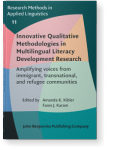Chapter 14
Conclusion: Innovative research on multilingual literacy
development
New directions for methodology
In this concluding chapter to the volume,
Innovative Qualitative Methodologies in Multilingual
Literacy Development Research: Amplifying Voices from Immigrant,
Transnational, and Refugee Communities, we argue for
the importance of responsive, inclusive, and ecological
epistemologies in guiding researchers engaged in critical and
equity-oriented qualitative research in multilingual contexts. We
close with implications for qualitative literacy researchers as they
rethink data, theory, and positionality in their work.
Article outline
- Introduction
- The value of responsive, inclusive, and ecological stances for
equity-oriented research
- The ethical motivation to be literacy researchers on the
move
-
References
This content is being prepared for publication; it may be subject to changes.
